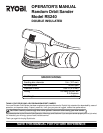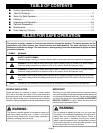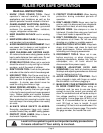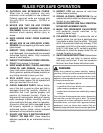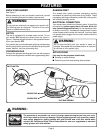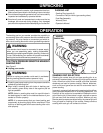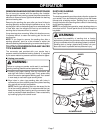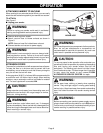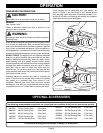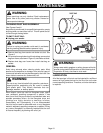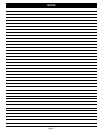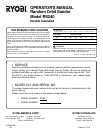
Page 7
OPERATION
REMOVING SANDING DISC BEFORE STORAGE
Do not store your sander with the sanding disc installed.
Heat generated from sanding causes the pressure sensitive
adhesive to flow and form a tight bond between the backing
pad and sanding disc.
Removing the sanding disc soon after you have finished a
sanding operation avoids letting the adhesive set up. If the
sanding disc is left on the backing pad for an extended period
of time after use, the adhesive will set up and cause the
sanding disc to become difficult to remove.
It may also tear when removing. When this situation occurs,
it becomes difficult to clean the backing pad for the next
sanding disc.
NOTE: If you forget to remove the sanding disc after a
sanding operation, sand for a few minutes to soften the
adhesive backing before attempting to remove sanding disc.
TO ATTACH CONVERSION PAD AND VELCRO
TYPE SANDING DISC
The conversion pad provided with your sander has a
pressure sensitive adhesive backing material. It is applied
by the same method as pressure sensitive adhesive paper.
■ Unplug your sander.
WARNING:
Failure to unplug your sander could result in accidental
starting causing possible serious personal injury.
■ Carefully peel paper backing from the conversion pad
and align with holes in backing pad. Firmly press sticky
side of conversion pad against backing pad. Your sander
is now ready to use velcro type sanding discs.
■ Align holes in velcro type sanding disc with holes in
conversion pad, then carefully press fuzzy side of sanding
disc against pad as tight as possible.
NOTE: Velcro type sanding discs can be reused for the
life of the sanding abrasive. It is recommended that you
keep the sanding disc backing and the conversion pad
clean to provide the best attachment. Clean occasionally
by brushing lightly with a small brush.
DUSTLESS SANDING
See Figures 3 and 4.
The dust bag assembly provides a dust collection system for
your sander. It can be installed by slipping it over the blower
exhaust with a twisting motion. Sanding dust is drawn up
through the holes of the sanding disc to collect in the dust bag
during sanding operation.
NOTE: For more efficient operation, empty dust bag when no
more than half full. This will permit the air to flow through the
bag better.
WARNING:
To prevent the possibility of sanding dust or foreign
objects being thrown into your face or eyes, never attempt
to use your sander without the dust bag properly installed.
Sanding dust or foreign objects being thrown into your
face could result in possible serious personal injury.
Fig. 3
BLOWER EXHAUST
SANDER
DUST BAG
Fig. 4
BLOWER EXHAUST



